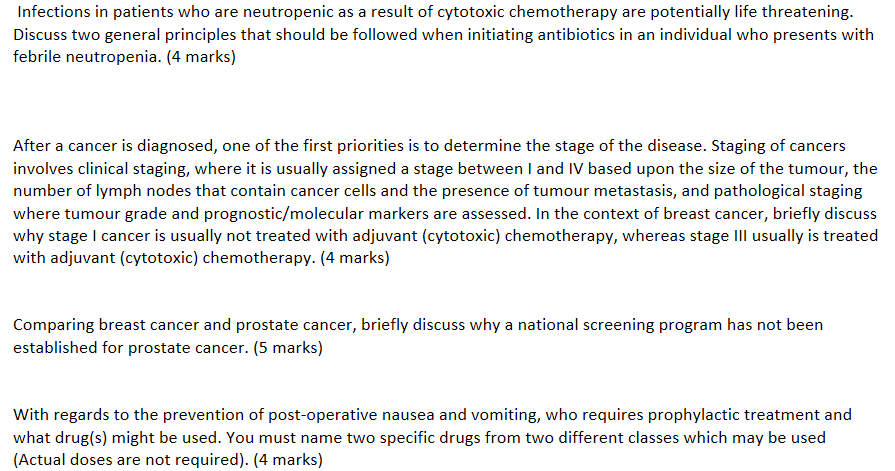Infections in patients who are neutropenic as a result of cytotoxic chemotherapy are potentially life threatening. Discuss two general principles that should be followed when initi... Infections in patients who are neutropenic as a result of cytotoxic chemotherapy are potentially life threatening. Discuss two general principles that should be followed when initiating antibiotics in an individual who presents with febrile neutropenia. After a cancer is diagnosed, one of the first priorities is to determine the stage of the disease. In the context of breast cancer, briefly discuss why stage I cancer is usually not treated with adjuvant (cytotoxic) chemotherapy, whereas stage III usually is treated with adjuvant chemotherapy. Comparing breast cancer and prostate cancer, briefly discuss why a national screening program has not been established for prostate cancer. With regards to the prevention of post-operative nausea and vomiting, who requires prophylactic treatment and what drug(s) might be used? You must name two specific drugs from two different classes which may be used.

Understand the Problem
The questions focus on various aspects of cancer treatment, specifically addressing infections in neutropenic patients, the staging of cancer, comparisons between breast and prostate cancer, and prevention of postoperative nausea and vomiting. Each question requires a concise discussion on specified topics within oncology.
Answer
Broad-spectrum antibiotics and prompt initiation manage febrile neutropenia. Stage I breast cancer often avoids chemotherapy; stage III does not. No prostate cancer screening due to overdiagnosis concerns. High-risk patients need PONV prophylaxis with ondansetron and dexamethasone.
The final answer is: Broad-spectrum antibiotics and prompt initiation within one hour are critical for managing febrile neutropenia. Stage I breast cancer is often treated with surgery and/or radiation because of its early stage, while stage III typically requires adjuvant chemotherapy due to greater spread and risk. National screening for prostate cancer hasn't been adopted due to concerns about overdiagnosis and overtreatment. For post-operative nausea and vomiting, high-risk patients require prophylactic treatment; options include ondansetron (a 5-HT3 receptor antagonist) and dexamethasone (a corticosteroid).
Answer for screen readers
The final answer is: Broad-spectrum antibiotics and prompt initiation within one hour are critical for managing febrile neutropenia. Stage I breast cancer is often treated with surgery and/or radiation because of its early stage, while stage III typically requires adjuvant chemotherapy due to greater spread and risk. National screening for prostate cancer hasn't been adopted due to concerns about overdiagnosis and overtreatment. For post-operative nausea and vomiting, high-risk patients require prophylactic treatment; options include ondansetron (a 5-HT3 receptor antagonist) and dexamethasone (a corticosteroid).
More Information
Prompt and broad antibiotic use is crucial in febrile neutropenia to prevent severe infections. Stage I breast cancer is less advanced, often treatable by local methods, whereas stage III is more aggressive. Overdiagnosis in prostate cancer can lead to unnecessary treatments. Ondansetron and dexamethasone effectively manage PONV.
Tips
A common mistake is delaying antibiotic treatment in febrile neutropenia, leading to increased risk. Misunderstanding cancer stages can result in incorrect treatment plans.
Sources
- Neutropenic sepsis: management and complications - PMC - NCBI - ncbi.nlm.nih.gov
- Infection and Neutropenia and Cancer Treatment - Side Effects - NCI - cancer.gov
AI-generated content may contain errors. Please verify critical information